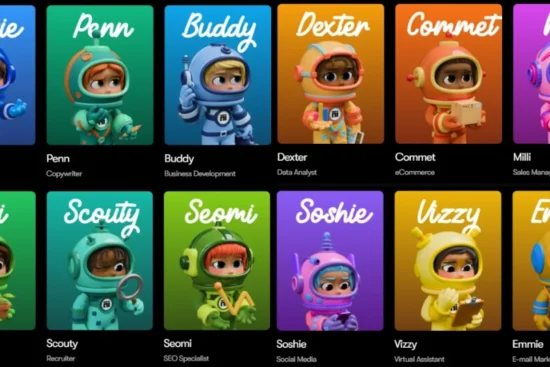
As digital transformation accelerates across industries and in everyday life, cloud storage has become essential for individuals and businesses alike. From safeguarding sensitive data to enabling seamless collaboration, cloud storage services offer flexibility, security, and cost-effectiveness. But with so many options available, choosing the right one can be overwhelming. In this article, we’ll provide a comprehensive comparison of the best cloud storage services in 2024, covering their key features, pricing, and suitability for various needs.
Why Cloud Storage?
Before diving into specific services, it’s important to understand why cloud storage is such a vital tool in today’s digital world. Traditional physical storage, such as hard drives or USBs, often falls short due to limited capacity and the risk of data loss from hardware failure or theft. Cloud storage, on the other hand, offers several key advantages:
- Accessibility: Access your files from anywhere with an internet connection, using any device.
- Scalability: Cloud storage is easily scalable, meaning you can increase or decrease storage space as your needs change.
- Collaboration: Many cloud storage services integrate with productivity tools, enabling real-time collaboration across different locations.
- Backup and Recovery: Automatic backups ensure your data is safe from hardware malfunctions or cyberattacks.
- Cost-effectiveness: Pay for only what you need, and avoid the upfront costs of physical infrastructure.
Now, let’s look at the top cloud storage solutions for 2024.
1. Google Drive
Overview
Google Drive is one of the most popular cloud storage services, thanks to its integration with Google Workspace and its ease of use. It provides both personal and business users with a seamless experience for file storage, sharing, and collaboration.
Key Features
- Integration with Google Workspace: Google Drive works smoothly with other Google apps like Docs, Sheets, and Slides, allowing for real-time collaboration on documents.
- Free Tier: Users get 15 GB of free storage, which includes storage for Gmail, Google Photos, and other Google services.
- Collaboration Tools: Drive makes it easy to share files and folders with others, with various permission levels (view, comment, or edit).
- Cross-platform Access: Available on all devices, including Android, iOS, Windows, and Mac.
Pricing
- Free Tier: 15 GB free.
- 100 GB Plan: $1.99 per month.
- 200 GB Plan: $2.99 per month.
- 2 TB Plan: $9.99 per month.
Pros
- Excellent integration with other Google apps.
- Affordable pricing for higher storage tiers.
- Real-time collaboration features.
Cons
- Storage is shared across all Google services.
- Privacy concerns due to Google’s data collection policies.
2. Dropbox
Overview
Dropbox is a pioneer in cloud storage and remains a top choice for individuals and businesses, particularly those who prioritize simplicity and collaboration. It focuses heavily on file synchronization and sharing.
Key Features
- File Syncing: Dropbox offers fast and reliable syncing across all devices.
- Collaboration Tools: Dropbox Paper, a document collaboration tool, allows teams to create and edit documents in real-time.
- File Versioning: Dropbox saves previous versions of your files for 30 days (up to 180 days on higher plans), which is great for recovering earlier versions.
- Smart Sync: Automatically saves space on your hard drive by storing files in the cloud while keeping them accessible.
Pricing
- Basic Plan: 2 GB free.
- Plus Plan: $11.99 per month for 2 TB.
- Family Plan: $19.99 per month for 2 TB (up to six users).
- Professional Plan: $19.99 per month for 3 TB.
Pros
- Excellent file syncing capabilities.
- Easy-to-use interface with robust collaboration features.
- Offers Smart Sync and file versioning.
Cons
- Higher pricing compared to some competitors.
- Free plan offers limited storage (only 2 GB).
3. Microsoft OneDrive
Overview
Microsoft OneDrive is a versatile cloud storage service that integrates tightly with Microsoft Office and Windows, making it an ideal choice for users in the Microsoft ecosystem.
Key Features
- Integration with Microsoft 365: OneDrive works seamlessly with Microsoft Word, Excel, PowerPoint, and Teams, offering a unified experience for users in the Office ecosystem.
- File Sharing and Collaboration: With OneDrive, you can share files and work together on documents in real-time, just like Google Drive.
- Personal Vault: Provides an extra layer of security for your most sensitive files, requiring additional authentication to access.
- Cross-platform Access: Available across Windows, macOS, iOS, and Android.
Pricing
- Free Tier: 5 GB free.
- 100 GB Plan: $1.99 per month.
- Microsoft 365 Personal: $6.99 per month (includes 1 TB of OneDrive storage and access to Microsoft Office apps).
- Microsoft 365 Family: $9.99 per month (includes 6 TB of storage for up to 6 users and Office apps).
Pros
- Excellent integration with Microsoft Office apps.
- Personal Vault provides added security.
- Affordable plans, especially when bundled with Microsoft 365.
Cons
- Free storage is limited to 5 GB.
- Collaboration tools, while effective, aren’t as streamlined as Google Drive.
4. iCloud Drive
Overview
Apple’s iCloud Drive is the go-to cloud storage solution for users deeply embedded in the Apple ecosystem. It’s particularly useful for backing up photos, files, and device settings across Apple devices.
Key Features
- Integration with Apple Ecosystem: iCloud Drive works seamlessly with macOS and iOS, syncing files, photos, and settings across devices.
- iCloud Photos: Automatically syncs and stores all your photos and videos in the cloud.
- Collaborative Tools: Allows collaboration on documents, though it’s not as feature-rich as some other platforms.
- Device Backup: iCloud is the default backup option for iPhones, iPads, and Macs.
Pricing
- Free Tier: 5 GB free.
- 50 GB Plan: $0.99 per month.
- 200 GB Plan: $2.99 per month.
- 2 TB Plan: $9.99 per month.
Pros
- Excellent integration with Apple devices.
- Affordable pricing, especially for lower storage tiers.
- Great for automatic device backups and media syncing.
Cons
- Limited collaboration tools compared to competitors like Google Drive and Dropbox.
- Free storage of only 5 GB can quickly be exhausted with device backups.
5. Amazon Drive
Overview
Amazon Drive offers basic cloud storage services, with a particular focus on media, making it a good choice for photographers and Prime members who want to store photos.
Key Features
- Free Unlimited Photo Storage for Prime Members: Amazon Prime members get unlimited storage for photos and 5 GB for videos.
- File Sharing and Collaboration: Supports sharing files and folders, though its collaboration features aren’t as advanced as others.
- Media Management: Provides tools for organizing and viewing photos and videos, including integration with Amazon Photos.
Pricing
- Free Tier: 5 GB free (unlimited photo storage for Prime members).
- 100 GB Plan: $1.99 per month.
- 1 TB Plan: $6.99 per month.
- 2 TB Plan: $11.99 per month.
Pros
- Prime members enjoy unlimited photo storage.
- Competitive pricing for larger storage plans.
- Ideal for users focused on photo and video storage.
Cons
- Collaboration features are basic.
- Limited integrations with third-party apps.
6. Box
Overview
Box is a cloud storage solution aimed primarily at business and enterprise users. It offers robust collaboration, security, and integration features that appeal to organizations with stringent data control needs.
Key Features
- Advanced Collaboration: Box offers document collaboration with Box Notes and integrates with platforms like Microsoft 365, Google Workspace, and Slack.
- High Security: Offers enterprise-grade security features, including encryption and data governance policies.
- Admin Controls: Comprehensive admin controls for managing users, permissions, and file access within a company.
- Third-party Integrations: Works with a wide range of business tools, including Salesforce, Adobe, and IBM.
Pricing
- Free Tier: 10 GB free.
- Personal Pro Plan: $10 per month for 100 GB.
- Business Plan: $15 per user per month for unlimited storage.
- Enterprise Plan: Custom pricing.
Pros
- High level of security and admin controls.
- Strong integration with business apps.
- Unlimited storage for business plans.
Cons
- Expensive for individual users.
- Interface can be overwhelming for beginners.
7. pCloud
Overview
pCloud is a secure cloud storage solution that offers both personal and business plans, known for its emphasis on security and privacy, including client-side encryption.
Key Features
- Client-side Encryption: pCloud offers a “pCloud Crypto” add-on for enhanced encryption, ensuring your data is secure before it even reaches their servers.
- Lifetime Plan: pCloud offers a unique one-time payment option for lifetime access to cloud storage.
- Media Playback: Includes a media player for streaming audio and video directly from the cloud.
- File Versioning: Keeps previous versions of your files for up to 30 days.
Pricing
- Free Tier: 10 GB free.
- Premium Plan: $49.99 per year for 500 GB.
- Premium Plus Plan: $99.99 per year for 2 TB.
- Lifetime Plans: $175 one-time payment for 500 GB; $350 one-time payment for 2 TB.
Pros
- Offers lifetime payment plans, a unique feature.
- Excellent security features with optional client-side encryption.
- Competitive pricing for both monthly and lifetime plans.
Cons
- pCloud Crypto requires an additional fee.
- Collaboration tools are not as extensive as some competitors.
Conclusion
In 2024, the cloud storage market offers a wide range of services, each catering to different needs, from individual users to large enterprises. Google Drive and Microsoft OneDrive remain strong options for personal and professional users seeking seamless integration with productivity suites. Dropbox excels in file syncing and collaboration, making it a favorite for teams. iCloud is the natural choice for Apple users, while Amazon Drive caters to photographers with unlimited photo storage. For businesses, Box and pCloud offer robust security and collaboration features, with pCloud standing out for its flexible pricing and lifetime plans.
When choosing a cloud storage solution, consider factors like storage capacity, pricing, collaboration features, and security. Whether you’re an individual needing secure backups or a business requiring robust data management, there’s a perfect cloud storage solution for you in 2024.












